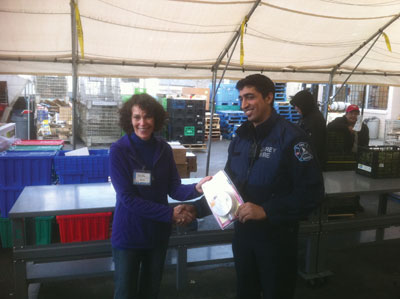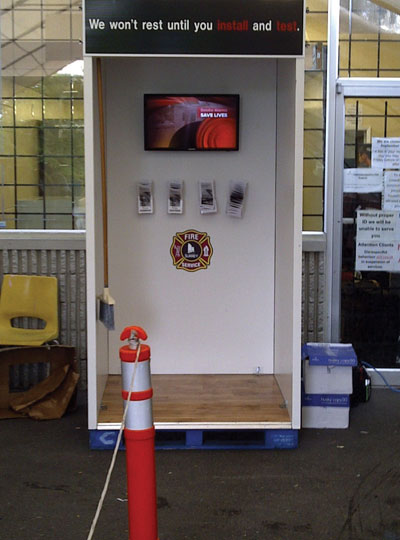
Features
Prevention
Hungry for knowledge
A strategic partnership has emerged in British Columbia with the intent to reduce fire injuries and fatalities among at-risk populations.
February 4, 2013
By Len Garis Joe Clare and Karin Mark
A strategic partnership has emerged in British Columbia with the intent to reduce fire injuries and fatalities among at-risk populations. Fire departments across the province have begun teaming up with British Columbia’s 90 food banks to provide free smoke-alarm education and installation to food-bank clients, who are often at an increased risk of fire.
 |
|
| A firefighter from Surrey Fire Service presents a worker at a food bank in British Columbia with a smoke alarm – one of 5,000 that Kidde Canada donated to the program.
|
Scientific evidence supports this observation. Studies in Canada and the United States have linked increased fire risk to characteristics such as poverty, age (young children and the elderly), smoking, disability, and mental health or substance abuse issues.
The initiative, which has the potential to reach 90,000 people in 42,000 households, is a component of the smoke-alarm campaign launched this spring by the Fire Chiefs’ Association of B.C. (FCABC) and the provincial government with the goal of ensuring that every British Columbia home has a working smoke alarm.
The partnership between food banks and the fire service was kicked off over the summer with a pilot project in Surrey, which has a history of leveraging data to strategically deploy fire-prevention resources. Surrey Fire Service’s HomeSafe program, for example, has been driving down fires since fall 2008 through door-to-door firefighter visits and smoke-alarm giveaways in the city’s at-risk neighbourhoods.
The notion of partnering with food banks arose when Surrey Fire Service (SFS) was considering what more it could do to promote working smoke alarms in the community, explained Deputy Fire Chief Karen Fry, who is in charge of fire prevention and communications.
“We were talking about targeting the high-risk groups we’d identified in our research as being more likely to not have a working smoke alarm in their residence,” Fry said. “Then we started thinking about organizations that low-income people may frequent.”
Fry and Surrey Fire Chief Len Garis, who is president of the FCABC, contacted the Surrey Food Bank and found a willing partner. It wasn’t the first time an organization had approached the food bank about reaching out to its clientele, said Marilyn Herrmann, the food bank’s executive director.
“We welcome requests to provide education and awareness building for our clients,” said Herrman, who is also the president of Food Banks BC “The clients love it when anybody comes in and provides them with free information or a gift that will increase their safety.”
Project details
During the pilot project, SFS members, on alternate duties, attended every distribution session at the food bank for two weeks in August. Clients waiting in line were offered the chance to win one of five $100 grocery gift cards if they completed a survey that helped SFS identify how many households had working smoke alarms.
 |
|
| Surrey Fire Service placed this display booth inside food banks to educate patrons about how to properly install and test a smoke alarm.
|
Inside the food bank, the firefighters set up a display booth that replicated a room with a ceiling, featuring a TV playing smoke-alarm education videos and a broom to demonstrate how to properly test a smoke alarm. Information brochures were also provided.
The project put SFS in contact with residents from 2,191 households that house a total of 4,820 people.
Of the 806 clients who took the survey, 97 reported not having a smoke alarm at all, and 62 reported having a smoke alarm that didn’t work. SFS followed up with those 159 clients and 47 accepted the offer of a free in-home alarm installation. In some cases, the client’s landlord proactively replaced the smoke alarms after learning about the initiative.
Ultimately, the project gave SFS access to a large number of high-risk individuals who – by virtue of waiting in line for their food-bank hampers – were a captive audience for smoke-alarm education. The SFS also hopes the positive personal contact will increase these individuals’ comfort with the fire services and make them receptive to future smoke-alarm and fire-prevention outreach efforts.
Following the pilot, a guide to implementing a food bank-smoke alarm awareness project was distributed to all FCABC members, and Food Banks BC members were notified that their local fire department may approach them about a partnership.
A number of British Columbia fire departments have begun initiating similar projects with their area food banks, including Vancouver and Salmon Arm.
In October, the food bank partnership received support from the British Columbia government and Aboriginal Affairs and Northern Development Canada, which committed to providing 2,500 smoke alarms for on-reserve First Nation families.
Keys to success
The following factors helped to ensure the success of the pilot project:
- Methodology: Research on smoke alarm giveaway initiatives has shown that it isn’t enough to simply hand out a smoke alarm – installation is critical, and education, namely the importance of working smoke alarms and how to maintain them, further extends the benefits.
- Resourcing: Staffing the project with members on alternate duties reduced the operational impact on the department. British Columbia fire departments were also shielded from the cost of buying smoke alarms through a donation of 5,000 alarms from Kidde Canada to the provincial smoke-alarm campaign for seedling provincial initiatives. Kidde is also offering the campaign a 60 per cent discount for additional alarm purchases.
- Timing: SFS worked with the food bank to schedule the visits when they would reach the most clients, but not during peak times, such as Christmas.
- Encouraging participation: Grocery gift cards were used to encourage clients to fill out surveys. Giveaways such as stickers, pens and wristbands were also well-received and encouraged parents to stop long enough to discuss smoke alarms with the firefighters.
- Focus on safety: The firefighters attempted to alleviate client concerns about having fire personnel enter their homes by clearly explaining that their only focus was to ensure the home has a working smoke alarm.
- Taking the initiative: While British Columbia food bank staff are aware of the benefits of educational opportunities for their clients, most have limited resources, Herrmann noted. Fire departments should be prepared to initiate the project and carry it out in a fashion that doesn’t tax the food bank’s resources.
Creating strategic fire-prevention opportunities
The individuals in a community who face the highest risks of fire injury or death are also, typically, the most difficult to reach. The food bank smoke-alarm initiative demonstrates the value of continually seeking new and varied opportunities to attempt to engage this vulnerable group.
The partnership between British Columbia fire departments and their local food banks is helping to raise awareness about the importance of smoke alarms while providing a hard-to-reach segment of the population with the tools and skills – that is, working smoke alarms and education about how to maintain them – to reduce their fire risk.
Len Garis is fire chief for the City of Surrey, B.C., president of the B.C. Fire Chiefs Association, and an adjunct professor in the School of Criminology and Criminal Justice at the University of the Fraser Valley and a member of the Institute of Canadian Urban Research Studies, Simon Fraser University. Contact him at lwgaris@surrey.ca
Karin Mark is a former newspaper reporter who writes for publications and corporate clients in Metro Vancouver, B.C.
Dr. Joe Clare, the strategic planning analyst for the Surrey Fire Service, is also an associate professor in the Crime Research Centre, University of Western Australia, and a member of the Institute of Canadian Urban Research Studies (ICURS), Simon Fraser University.
Print this page